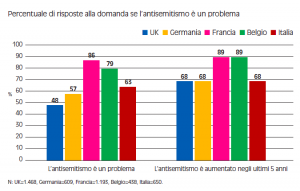NEWS Perceptions of Antisemitism in Italy. New Study Highlights Increased Concern
A new study published this week by the Institute for Jewish Policy Research and anticipated in the February issue of Pagine Ebraiche demonstrates that antisemitism is a significant concern among Jews in Italy, with clear indications that many perceive it to be a growing problem, particularly online. Co-Authored by Sergio Della Pergola – Associate Fellow at JPR and the Shlomo Argov Professor Emeritus of Israel-Diaspora Relations at the Avraham Harman Institute of Contemporary Jewry, the Hebrew University of Jerusalem – and Dr Daniel Staetsky, who is a Senior Research Fellow at JPR and Visiting Research Fellow in the Department of Sociology at the University of Cambridge, the report shows that most Italian Jews feel well integrated into Italian society, antisemitic violence is rare, and only a minority feels sufficiently unsafe to be considering their future in the country.
The report, entitled “From Old and New Directions. Perceptions and experiences of antisemitism among Jews in Italy”, also highlights the particular nature of antisemitism in the country, indicating that today it is more commonly grounded in political ideologies – from both the left and right – than in religious extremism, and suggesting that it is driven both by old style right-wing nationalism, and newer forms of left-wing antipathy informed by a spill-over of incidents in Israel and the Middle East. Co-author of the report, Professor Sergio Della Pergola, commented: “This study clearly demonstrates the multi-faceted nature of antisemitism and shows the persisting ability of European Jews to distinguish between actual and potential harassment, between real and virtual discrimination, and between the different dimensions of antisemitism, anti-Judaism, anti- Zionism.”
“Research has the advantage (and disadvantage) of being somewhat disconnected from the daily occurrences of life because of the time involved in conceptualization, data collection, data processing, report writing, and publication. To some extent then research lags behind the events, but it also aims to anticipate them. In a sense, the findings of the FRA study were prophetic, bearing in mind the tragic events at the Jewish Museum in Brussels last May and in Paris last month. It captured a trend of increasing concern since the middle of the first decade of the 21st century, a trend that is likely to have continued since autumn 2012, the period of our fieldwork.”
He added: “European community and national country institutions will be well advised to listen carefully to the findings and conclusions of this study. Hopefully they will also translate the emerging concerns into actual provisions for a better and more secure Jewish and European community.”
The data in the report were gathered and analyzed by researchers at the Institute for Jewish Policy Research in the UK, as part of a major study commissioned by the European Union Agency for Fundamental Rights (FRA) in 2012. The general findings from that study were published in a landmark report in late 2013, but have been analyzed afresh in this follow-up study, the second in a series of JPR reports about antisemitism in different European Member States.”
JPR Executive Director, Dr Jonathan Boyd, commented: “Advanced statistical analysis of the FRA data has allowed our research team to take a close and detailed look at the situation in Italy, enabling us to shine a light on the particular nature and scale of antisemitism in the country, and to focus directly on the perceptions and experiences of Italian Jews.”
This more detailed work reveals that younger Jews are markedly more likely than older Jews in the country to experience antisemitic harassment and discrimination. They are also more likely to be worried about becoming a victim of an antisemitic attack and to avoid Jewish events or certain locations as a result. It further reveals differences in the perceptions and experiences of Orthodox and non-Orthodox Jews, with Orthodox Jews consistently more likely to feel the situation has deteriorated and to be anxious about the possibility of antisemitic assault.
The report also identifies Rome – home to the largest and most visible Jewish community in Italy – as the place in the country where antisemitism is felt with the greatest intensity. The report authors suggest that this may be due to the higher visibility of public demonstrations that are naturally organized in the country’s capital city, but also posit the theory that it might be related to Rome having a traditionally right-wing electorate.

